Since
long ago, I have had the ambition to visit various indigenous villages
in West Java. Alhamdulillah, towards the end of 2023, I and Zauji
finally realized this ideal by visiting directly to greet the uniqueness
of Kampung Naga Tasikmalaya.
Kampung
Naga is located right on Jalan Raya Garut—Tasikmalaya, Neglasari
Village of Salawu District, Tasikmalaya Regency. From the direction of
Bandung, Kampung Naga is easier to reach through Garut by bus or
private vehicle. Public transport or online ojek is available from the
direction of Singaparna.
Actually,
we were offered to stay at the Dragon Village Guest House or in Kampung
Naga itself. I did not choose the Guest House option because I and
Zauji hesitated to join other guests in the same building as the shared bathroom.
 |
| Bathroom in a 1st-floor guest house that doubles the stalls |
And
it feels like I don't have the guts to spend the night in Kampung Naga
because there is no electricity, while the bathroom area and latrines are
outside the settlement.
Finally,
Zauji and I chose the Al Hambra Hotel, which is located 15 km from Kurleb
and can be reached by car or motorcycle within 25 minutes.
To
reach Kampung Naga, we had to go down 414 steps made of sturdy and not slippery times with a slope of 45 degrees (some also say 335 or 439
steps). Beautiful scenery, rows of trees, green rice fields, clear river water, and unique traditional houses become tired antidotes.
the Dragon Village Community
Kampung
Naga village has an area of 1.5 hectares and is inhabited by about
400 people. Initially the house in Kampung Naga was 40, but along with
the increase in population, the number of houses increased until now it has survived in 110 houses. And of course, the limited land and rules that
prohibit the expansion of residential areas so as to make some residents
of Kampung Naga move outside the Kampung Naga area, even outside
Tasikmalaya Regency.
Although
far from the Dragon Village, they still hold fast to the customs of the
ancestral heritage that is often called Sa-Naga, like the Hajat Sasih
ceremony. The people of Kampung Naga adhere to the religion of Islam and
still hold firm to the customs of their ancestors.
Wooden
houses, walled cubicles, or bamboo webbing and ijuk roofs (black
and hard fibers that serve as a base protection of palm leaf pelas).
There is no electricity; everything is so simple with the peculiarities
of the countryside. The houses in Kampung Naga are also taboo to be
painted so that they still show the original color and texture that
actually add to the exotic.
In
everyday life, the people of Kampung Naga meet daily needs with
farming, gardening, and breeding. Other activities include selling bamboo crafts and food commodities such as young coconuts and palm sugar typical of
Kampung Naga or becoming a tour guide for tourists. Some become
freelancers, private employees, and even public servants.
The people of Kampung Naga still cook by using hawu (knach) and firewood. I myself enjoy honje
vegetables (kecombrang), pepes, goldfish, and cassava leaves that taste
much better. (And when I got home, I just woke up with a ‘natural fish
tap’ that was commonly used in the fish pond under the latrines located
outside the fence of Kampung Naga.).
Among friends, you can also find cimol or pop ice (without a blender, of course) as a
snack in Kampung Naga. When I peeked, it turned out that the seller used
a kerosene stove to fry because Kampung Naga was still included in the
region that received kerosene subsidies from the government.
No
wonder this hospitality has become commonplace because the people of
Kampung Naga have become accustomed to mingling with people outside the
village or guests who come to visit. We are free to chat in Sundanese, which we commonly use every day or Indonesian.
Kampung
Naga's children went to school outside the village. No wonder if
Menong's friends see photos hanging in the house or ordinary clothes
worn by the people of Kampung Naga. Everyday clothes are not much
different from us.
Indigenous Idetics of Kampung Naga
When
going to visit the customary village, of course, Menong’s friends will
learn what the prohibitions or abstinences are that should not be
violated. Before leaving, my friend had warned me not to take any video
while in the Dragon Village.
This rule was
actually only made after a YouTuber created content about Kampung Naga
that was not pleasing in the hearts of the people of Kampung Naga, and there was no apology from the concerned.
The
second rule is that it is forbidden to photograph Bumi Ageung, a meeting hall
located at the very back of the uppermost residential area, close to the
prohibition forest, surrounded by bamboo fences. When sitting anywhere,
we are not allowed to sit with the legs facing the Earth.
The
bathroom and latrine area is also placed outside the settlement and
bounded by bamboo fences so that the sanctity of the residential area is
maintained. This will certainly be troublesome if Menong’s friends
intend to stay in Kampung Naga. Without electricity, activity at night
is only accompanied by a petromak lamp, usually called a sting.
It's
just that the activity of washing clothes and cutlery can be done in
the area next to the mosque that does provide water flow (pounding) for
ablution. I can also see the remnants of clothing fragrance packaging
that can be used.
And
of course we are forbidden to enter the prohibition forest and sacred
forest that are around the village. One of the elders stated this
abstinence was actually to maintain the balance and sustainability of
nature around the Dragon Village.
There are no
rules regarding the clothes we have to wear. Definitely choose clothes
that are polite but can easily absorb sweat (because it goes up and down
the stairs) and protect the skin from the scorching sun. Also use shoes
or mountain sandals that are comfortable and not slippery. Prepare a
hat when needed.
Best Trip
I
myself like the trip this time, even though I have to spend extra energy going down and going up the stairs. The second time, I did go down
alone without Zauji, so I had a lot of time to take photos and enjoy the
atmosphere. On the way home, I also prepared the energy to climb the
stairs.
Thank God I managed to go up with one
break (without snacks in the stall like the day before) even though the
breath felt broken. Arriving at the top, the friends who went up later
had arrived at the guest house. It turns out they're going through shortcuts whose paths are not too extreme.
Unlike
other tourist destinations, there is no entrance ticket that we have to
pay. The price of souvenirs and snacks is relatively normal. Cimol for
Rp. 5000 and young coconut for Rp. 10,000. We also buy mature durian
trees that are sold by residents at a price of Rp. 35,000 that we
enjoyed on the porch of the house while chatting.
Menong’s
friends can buy souvenirs at some houses in Kampung Naga or in the
staircase and parking area. The typical souvenir of Kampung Naga is made
of bamboo, which distinguishes it from the other souvenirs of Kampung Naga,
which are sold here.
I myself bought a bamboo
fan at a price of Rp. 15,000/ 2 pieces. Actually, it can be bargained, but it
feels like I can't afford to buy at a lower price.
Because
it coincides with the social activities of an institution, many sellers,
such as basos, balloons, and others, come (don’t imagine how
these sellers bring their merchandise down and up the stairs!).
I was also allowed to take photos of the inside of the house and enjoy the rice dishes cooked using se’eng
(the traditional Sundanese rice plant that I may have never seen for
a long time). I also admire the furniture made from bamboo that looks sturdy and the zinc tableware that is now also widely used by restaurants or
cafes because of its uniqueness. Other friends also took the time to
follow Friday prayers in the village mosque.
The
uniqueness of Kampung Naga Tasikmalaya is already known to many people.
This is the first time I’ve been to the customary village. There are a
lot of stories and wisdom that we can get. In the midst of the onslaught
of globalization, there are still people who survive with their wisdom
that is synergistic with the harmony of nature.

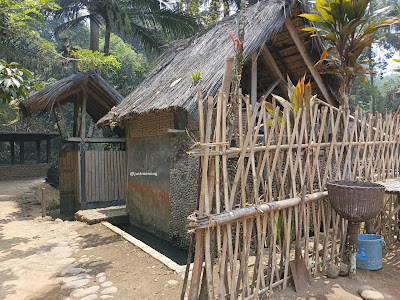
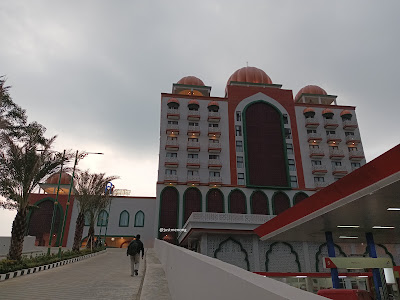
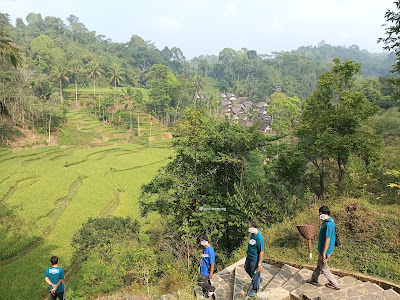

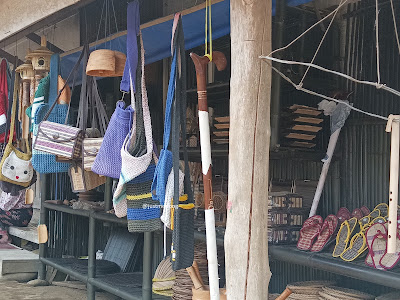
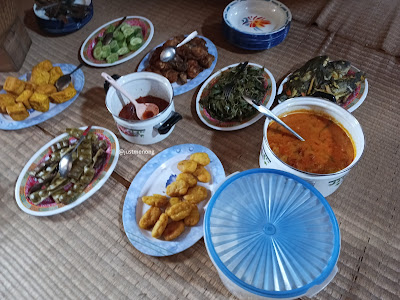
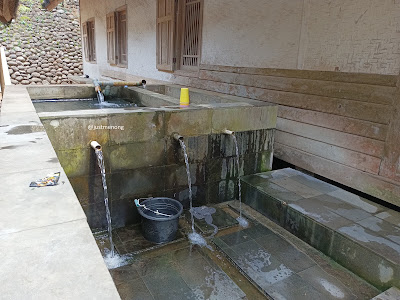
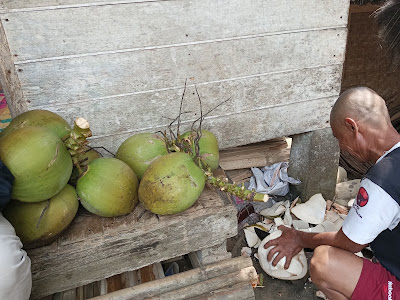
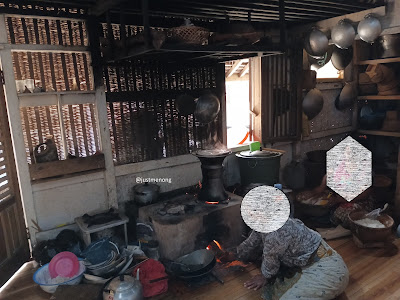



Post a Comment
Post a Comment